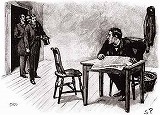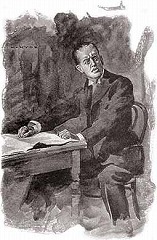“Quite so, of course,” said Holmes. “I should like to have a look at the gentleman and see if I can make anything of his little game. What qualities have you, my friend, which would make your services so valuable? Or is it possible that- -” He began biting his nails and staring blankly out of the window, and we hardly drew another word from him until we were in New Street.
At seven o’clock that evening we were walking, the three of us, down Corporation Street to the company’s offices.
“It is no use our being at all before our time,” said our client. “He only comes there to see me, apparently, for the place is deserted up to the very hour he names.”
“That is suggestive,” remarked Holmes.
“By Jove, I told you so!” cried the clerk. “That’s he walking ahead of us there.”
He pointed to a smallish, dark, well-dressed man who was bustling along the other side of the road. As we watched him he looked across at a boy who was bawling out the latest edition of the evening paper, and, running over among the cabs and busses, he bought one from him. Then, clutching it in his hand, he vanished through a doorway.
“There he goes!” cried Hall Pycroft. “These are the company’s offices into which he has gone. Come with me, and I’ll fix it up as easily as possible.”

Following his lead, we ascended five stories, until we found ourselves outside a half-opened door, at which our client tapped. A voice within bade us enter, and we entered a bare, unfurnished room such as Hall Pycroft had described. At the single table sat the man whom we had seen in the street, with his evening paper spread out in front of him, and as he looked up at us it seemed to me that I had never looked upon a face which bore such marks of grief, and of something beyond grief - of a horror such as comes to few men in a lifetime. His brow glistened with perspiration, his cheeks were of the dull, dead white of a fish’s belly, and his eyes were wild and staring. He looked at his clerk as though he failed to recognize him, and I could see by the astonishment depicted upon our conductor’s face that this was by no means the usual appearance of his employer.

“You look ill, Mr. Pinner!” he exclaimed.
“Yes, I am not very well,” answered the other, making obvious efforts to pull himself together and licking his dry lips before he spoke. “Who are these gentlemen whom you have brought with you?”
“One is Mr. Harris, of Bermondsey, and the other is Mr. Price, of this town,” said our clerk glibly. “They are friends of mine and gentlemen of experience, but they have been out of a place for some little time, and they hoped that perhaps you might find an opening for them in the company’s employment.”
“Very possibly! very possibly!” cried Mr. Pinner with a ghastly smile. “Yes, I have no doubt that we shall be able to do something for you. What is your particular line, Mr. Harris?”
“I am an accountant,” said Holmes.
“Ah, yes, we shall want something of the sort. And you, Mr. Price?”
“A clerk,” said I.
“I have every hope that the company may accommodate you. I will let you know about it as soon as we come to any conclusion. And now I beg that you will go. For God’s sake leave me to myself!”
These last words were shot out of him, as though the constraint which he was evidently setting upon himself had suddenly and utterly burst asunder. Holmes and I glanced at each other, and Hall Pycroft took a step towards the table.
“You forget, Mr. Pinner, that I am here by appointment to receive some directions from you,” said he.